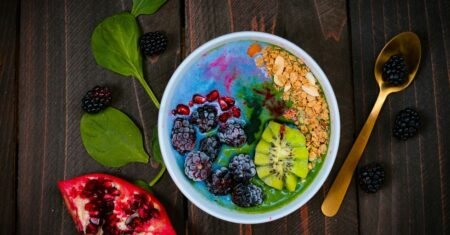
In a world where health advice is everywhere, understanding nutrition is key to living a healthier life. This article will break down essential nutrition concepts, helping you make informed choices about what you eat. From the basics of macronutrients to the importance of hydration, you’ll discover how to nourish your body effectively.
Key Takeaways
- Nutrition is about understanding how food affects our body and health.
- A balanced diet includes the right mix of proteins, fats, and carbohydrates.
- Hydration is just as important as food for overall health.
- Superfoods can be beneficial, but they aren’t magic solutions.
- Meal planning can help you eat healthier and save time.
Understanding the Basics of Nutrition
What is Nutrition?
Nutrition is all about how our bodies use food to stay healthy and grow. It’s not just about eating; it’s about fueling your body! When we talk about nutrition, we’re really discussing the nutrients that our bodies need to function well. Here are the main types of nutrients:
- Carbohydrates: Your body’s main energy source.
- Proteins: Essential for building and repairing tissues.
- Fats: Important for energy and cell health.
- Vitamins and Minerals: Help your body perform various functions.
Macronutrients vs. Micronutrients
So, what’s the difference between macronutrients and micronutrients? Well, macronutrients are the big players that provide energy, while micronutrients are the tiny but mighty helpers that support our health. Here’s a quick breakdown:
- Macronutrients: Carbs, proteins, and fats.
- Micronutrients: Vitamins and minerals.
- Water: Often overlooked, but super important for hydration!
The Role of Calories in Your Diet
Calories are a way to measure energy. Understanding calories is key to managing your weight! Here’s what you need to know:
- Your body needs a certain number of calories to function daily.
- Eating too many calories can lead to weight gain.
- Eating too few can leave you feeling tired and weak.
Remember, it’s not just about counting calories; it’s about choosing the right foods to nourish your body!
The Importance of a Balanced Diet
Why Balance Matters
I can’t stress enough how crucial it is to have a balanced diet. It’s not just about eating your veggies; it’s about getting the right mix of nutrients. A balanced diet helps keep your energy levels up and your body functioning well. Without it, you might feel sluggish and unmotivated.
Components of a Balanced Diet
So, what does a balanced diet look like? Here are the key components:
- Fruits and Vegetables: Aim for a variety of colors on your plate.
- Proteins: Think lean meats, beans, and nuts.
- Whole Grains: Choose brown rice, whole wheat bread, and oats.
- Healthy Fats: Include avocados, olive oil, and fish.
Common Myths About Balanced Eating
There are a lot of myths out there about what it means to eat balanced. Here are a few I’ve come across:
- Carbs are bad: Nope! Your body needs carbs for energy.
- You can’t eat fats: Healthy fats are essential for your body.
- All calories are equal: The quality of your food matters just as much as the quantity.
Remember, proper nutrition is imperative to maximize athletic performance. Without enough carbohydrates, proteins, and fats, athletes may feel sluggish during a workout.
Eating a balanced diet isn’t just about looking good; it’s about feeling good and performing at your best!
Superfoods: Fact or Fiction?

What Are Superfoods?
So, let’s dive into the world of superfoods! These are foods that are packed with nutrients and are said to have amazing health benefits. But, are they really as magical as they sound? Superfoods can be a great addition to your diet, but they aren’t a cure-all.
Popular Superfoods and Their Benefits
Here are some popular superfoods and what they can do for you:
- Blueberries: Loaded with antioxidants, they can help fight off diseases.
- Kale: This leafy green is full of vitamins A, C, and K, plus it’s super low in calories.
- Edamame: Why is edamame a superfood? It contains protein, fiber, and essential nutrients like vitamin C, calcium, magnesium, and iron.
Debunking Superfood Myths
Now, let’s clear up some myths:
- Superfoods are not a magic solution: Eating them won’t instantly make you healthy.
- Variety is key: Relying on just a few superfoods isn’t enough; a balanced diet is crucial.
- Costly doesn’t mean better: Some superfoods can be pricey, but many affordable options are just as nutritious.
Remember, while superfoods can boost your health, they should be part of a balanced diet. Don’t forget to enjoy a variety of foods for the best results!
Nutrition for Different Life Stages

Nutrition for Kids
When it comes to kids, nutrition is super important! They’re growing and need the right fuel. Here’s what I think:
- Focus on whole foods: Fruits, veggies, and whole grains are key.
- Include proteins: Chicken, beans, and nuts help them grow strong.
- Don’t forget dairy: Milk or yogurt is great for bones.
Nutrition for Adults
As adults, we need to keep our energy up and stay healthy. Here’s how:
- Balance is everything: Make sure to include all food groups.
- Watch portion sizes: Eating too much can lead to weight gain.
- Stay active: Exercise helps with digestion and overall health.
Nutrition for Seniors
For seniors, nutrition can help maintain health and energy. Here are some tips:
- Stay hydrated: Water is crucial, especially as we age.
- Nutrient-dense foods: Focus on foods rich in vitamins and minerals.
- Regular meals: Eating smaller, frequent meals can help with digestion.
Remember, the first 6 months are a critical period in your baby’s health. Discover which proteins, fats, and vitamins they need to stay healthy during this period!
How to Read Food Labels
Understanding Nutritional Information
Reading food labels can feel like deciphering a secret code, but it’s super important for making healthy choices. Here’s what to look for:
- Serving Size: This tells you how much of the food is considered one serving. It’s crucial because all the nutritional info is based on this amount.
- Calories: Keep an eye on how many calories are in a serving. Remember, the text often says: "percent daily values are based on a 2,000-calorie diet." Your needs might be different, so adjust accordingly.
- Nutrients: Look for key nutrients like fiber, protein, and sugars. Aim for foods high in fiber and protein, and low in added sugars.
Ingredients to Watch Out For
Not all ingredients are created equal! Here are some to be cautious about:
- Trans Fats: These are bad for your heart and should be avoided.
- High Fructose Corn Syrup: This sweetener can sneak into many products and is linked to health issues.
- Artificial Additives: Preservatives and colorings can be harmful, so it’s best to choose natural options when possible.
Tips for Making Healthier Choices
- Compare Labels: When you’re shopping, compare similar products to find the healthier option.
- Focus on Whole Foods: Try to choose foods with fewer ingredients, especially those you can pronounce!
- Don’t Be Fooled by Marketing: Just because a product says "low-fat" or "sugar-free" doesn’t mean it’s healthy. Always check the label.
Understanding food labels is like having a map in a grocery store. It helps you navigate your way to healthier choices!
The Connection Between Nutrition and Mental Health
Foods That Boost Your Mood
Hey there! You might not realize it, but what you eat can really affect how you feel. Here are some foods that can help lift your spirits:
- Fruits and veggies: They’re packed with vitamins and minerals that can help your brain.
- Whole grains: Foods like brown rice and oats can keep your energy steady.
- Healthy fats: Think avocados and nuts; they’re great for brain health!
Nutrients for Brain Health
I’ve learned that certain nutrients are super important for keeping our brains happy. Here are a few:
- Omega-3 fatty acids: Found in fish, they’re known to support brain function.
- B vitamins: These help with energy and mood regulation.
- Antioxidants: Foods like berries can protect your brain from damage.
The Gut-Brain Axis
Did you know that your gut and brain are connected? It’s true! Here’s how:
- Gut health: A healthy gut can lead to a happier mind.
- Probiotics: Foods like yogurt can help balance your gut bacteria.
- Stress management: Reducing stress can improve gut health, which in turn can boost your mood.
A balanced approach to eating may be best for brain health. Those who followed the balanced dietary pattern had the fewest mental health issues and the highest scores for cognitive functions compared with the other diets.
So, next time you’re feeling down, think about what you’re eating. It might just be the key to feeling better!
Meal Planning Made Easy
Benefits of Meal Planning
Meal planning is a game changer! It helps me save time, money, and stress. Here’s why I love it:
- Saves time during the week.
- Helps me stick to my healthy eating goals.
- Reduces food waste by using what I buy.
How to Create a Meal Plan
Creating a meal plan doesn’t have to be hard. Here’s how I do it:
- Choose a day to plan meals for the week.
- Look at what I already have in the fridge and pantry.
- Pick recipes that use those ingredients.
- Write down a shopping list for anything I need.
Meal Prep Tips and Tricks
Meal prepping makes my life easier! Here are some tips:
- Cook in bulk and store meals in the fridge or freezer.
- Use clear containers to see what I have.
- Label everything with dates to keep track.
Meal planning is all about making healthy, home-cooked meals easier. With a little prep, I can enjoy delicious food without the hassle!
The Truth About Diet Trends
Popular Diets Explained
Let’s be real: there are a ton of diets out there, and it can get super confusing. From keto to paleo, everyone seems to have an opinion. But not all diets are created equal! Here are a few popular ones:
- Keto: High fat, low carb. It can help with weight loss, but it’s not for everyone.
- Paleo: Focuses on whole foods like meats and veggies. It’s all about eating like our ancestors.
- Intermittent Fasting: This isn’t about what you eat, but when you eat. It can be effective, but it’s not a magic solution.
Pros and Cons of Diet Trends
Every diet has its ups and downs. Here’s a quick look:
- Pros: Some diets can help with weight loss and improve health markers.
- Cons: Many are hard to stick to long-term and can lead to yo-yo dieting.
- Balance is Key: Instead of jumping from one diet to another, finding a balanced approach works better for most people.
How to Choose the Right Diet for You
Choosing a diet can feel overwhelming, but it doesn’t have to be! Here’s how I approach it:
- Listen to Your Body: What feels good for you? Everyone is different.
- Research: Look into the science behind the diet. Is it sustainable?
- Consult a Professional: Sometimes, talking to a nutritionist can help you find what works best for you.
Remember, the goal is to nourish your body, not to restrict it. Finding a way to eat that makes you feel good is what really matters!
Hydration and Its Role in Nutrition
Staying hydrated is super important for our overall health. Water is essential for almost every function in our bodies! Here’s why hydration matters:
Why Hydration is Important
- Regulates body temperature: Keeping cool is crucial, especially during hot days or workouts.
- Supports digestion: Water helps break down food so our bodies can absorb nutrients.
- Boosts energy levels: Feeling sluggish? It might just be a sign you need more water!
How Much Water Do You Need?
The National Academy of Medicine recommends about 11 cups (88 ounces) per day for women and 15 cups (120 ounces) for men. If that seems steep, remember that you can also get hydration from foods like fruits and veggies!
Hydrating Foods and Beverages
Here are some great options to keep you hydrated:
- Watermelon: Juicy and refreshing!
- Cucumbers: Crunchy and hydrating.
- Coconut water: A tasty way to replenish electrolytes.
Staying hydrated isn’t just about drinking water; it’s about making smart choices throughout the day.
So, next time you’re feeling a bit off, check in with your hydration levels. It might just be the boost you need!
Supplements: Do You Really Need Them?

Common Types of Supplements
When it comes to supplements, there are a few that pop up all the time. Here’s a quick list of the most common ones:
- Multivitamins: A little bit of everything in one pill.
- Fish oil: Great for heart health and brain function.
- Vitamin D: Especially important if you don’t get enough sun.
When to Consider Supplements
So, should you be taking them? Here are some situations where supplements might be helpful:
- If you have a specific deficiency (like low iron).
- If you’re on a restrictive diet that might lack certain nutrients.
- If you’re older and need extra support for your bones or immune system.
Risks and Benefits of Supplement Use
Just because you can take a supplement doesn’t mean you should. Here are some pros and cons:
- Pros:
- Can help fill nutritional gaps.
- May boost your overall health.
- Convenient for busy lifestyles.
- Cons:
- Some can interact with medications.
- Overdoing it can lead to health issues.
- Not a substitute for a healthy diet.
Remember, it’s always best to get your nutrients from food first. Supplements can help, but they shouldn’t replace a balanced diet.
In the end, I think it’s super important to talk to a healthcare professional before starting any new supplement. They can help you figure out what’s best for your unique needs!
Eating for Exercise and Performance

Pre-Workout Nutrition
When I’m gearing up for a workout, I make sure to fuel my body right. Eating the right foods can make a huge difference! Here’s what I usually focus on:
- Carbs: They give me the energy I need. I love bananas or oatmeal before hitting the gym.
- Protein: I aim to consume at least 70 grams of protein throughout the day so that I begin any workout well-fueled. This helps my muscles recover and grow.
- Hydration: Staying hydrated is key! I always drink water before I start exercising.
Post-Workout Recovery Foods
After I finish my workout, I know it’s time to refuel. Here’s what I usually grab:
- Protein shake: It’s quick and helps my muscles recover.
- Greek yogurt: Packed with protein and delicious!
- Fruits: They help replenish my energy levels.
Remember, what you eat after working out is just as important as what you eat before. It’s all about giving your body what it needs to recover and grow stronger!
Hydration for Athletes
I can’t stress enough how important hydration is. I try to drink water throughout the day, especially before and after workouts. Sometimes, I even add electrolyte drinks to keep my energy up during intense sessions. Staying hydrated helps me perform better and feel great!
Sustainable Eating Habits
What is Sustainable Eating?
Sustainable eating is all about making food choices that are good for our health and the planet. It means picking foods that are grown and produced in ways that don’t harm the environment. Eating sustainably can help reduce waste and support local farmers. Here are some key points to consider:
- Choose local and seasonal foods whenever possible.
- Reduce meat consumption and try plant-based meals.
- Avoid processed foods that come in lots of packaging.
Benefits of Eating Sustainably
Eating sustainably isn’t just good for the Earth; it’s also great for us! Here’s why:
- It can improve your health by focusing on whole foods.
- It supports local economies and farmers.
- It helps reduce your carbon footprint.
Making small changes in your eating habits can lead to a healthier lifestyle and a happier planet.
How to Make Sustainable Food Choices
Making sustainable choices can be simple! Here are some tips:
- Plan your meals to avoid food waste.
- Buy in bulk to reduce packaging.
- Grow your own herbs or veggies if you can.
By following these steps, you can enjoy delicious meals while also caring for our planet!
Eating sustainably is not just a trend; it’s a way to help our planet. By choosing local and seasonal foods, you can make a big difference. Want to learn more about how to eat better for the environment? Visit our website for tips and resources!
Wrapping It Up: Your Path to a Healthier Life
So there you have it! Nutrition is super important for living a happy and healthy life. It’s not just about eating your veggies; it’s about finding a balance that works for you. Remember, small changes can lead to big results. Start by picking one or two healthy habits to try out today. Whether it’s drinking more water or swapping out junk food for something nutritious, every little bit helps. Keep learning, stay curious, and don’t be afraid to ask for help if you need it. You’ve got this, and a healthier, happier you is just around the corner!
Frequently Asked Questions
What is nutrition and why is it important?
Nutrition is the study of how food affects our health. It’s important because the right foods help our bodies grow, stay strong, and fight off sickness.
What are macronutrients and micronutrients?
Macronutrients are nutrients we need in large amounts, like carbohydrates, proteins, and fats. Micronutrients are vitamins and minerals we need in smaller amounts, but they are still essential for our health.
How do I know if I have a balanced diet?
A balanced diet includes a variety of foods: fruits, vegetables, whole grains, proteins, and healthy fats. If you’re eating different types of foods, you’re likely balanced.
Are superfoods really that special?
Superfoods are foods that are very nutritious. While they can be beneficial, no single food can provide all the nutrients you need.
How does nutrition change as we age?
As we age, our bodies need different nutrients. For example, older adults may need more calcium and vitamin D for bone health.
What should I look for on food labels?
Look for the amount of calories, sugars, and fats. It’s also good to check for whole ingredients and avoid foods with a lot of additives.
Can what I eat affect my mood?
Yes! Certain foods can boost your mood. For example, foods rich in omega-3 fatty acids, like fish, are good for brain health.
Do I need to take supplements?
Most people can get all the nutrients they need from a balanced diet. However, some may need supplements if they have specific health issues or dietary restrictions.
About the Author






0 Comments